Business
Tories would swap ‘rip-off’ degrees for apprenticeships

Hazel Shearing,Alice Evans
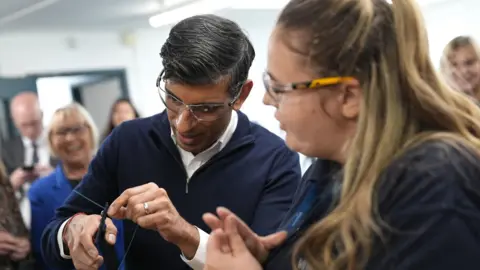 PA
PAThe Conservatives have promised to scrap some university courses in England to help fund 100,000 apprenticeships per year if they win the July election.
The party says it would replace the “worst-performing” degrees that it considers a “rip-off” because of high drop-out rates and “poor” job prospects.
Labour criticised the government over a decline in the number of new apprentices.
It said it would prioritise “gearing” apprenticeships towards young people.
The Liberal Democrats said the government had treated apprentices like “second-class workers”.
The Conservatives said former Labour Prime Minister Tony Blair’s ambition to get half of young people going to university had “led to low-value degrees ballooning”.
In England, the Office for Students (OfS) can already investigate and sanction a university – for example with fines – if it falls below certain standards.
The Conservatives say they would introduce a new law allowing the independent regulator to go further and completely close the poorest-performing university courses.
They would be determined by drop-out rates, job progression and future earnings potential, the party said in a press release.
Speaking at a railway depot in Cornwall on Wednesday, Prime Minister Rishi Sunak added: “University is great and it makes a fantastic option for young people, but it’s not the only option… And what we do know is that there are university degrees that are letting young people down.”
Schools Minister Damian Hinds told BBC Radio 4’s Today programme there had been a “huge increase in quality” in apprenticeships under Conservative governments. Now was the time to “make sure we’re maximising the available opportunities for young people” and supporting businesses with the new scheme, he added.
Mr Hinds said it would not be “right or fair” on current students to say which courses his party considered to be “rip-off” degrees, and said it varied by individual courses rather than by subject.
“Take computer science – you get earnings outcomes from young people studying computer science degrees which will range from £18,000 to £80,000.”

The Conservative Party estimated that the government would save £910m by 2030 if it scrapped courses that taught 13% of students.
It said this was because the taxpayer “offsets” student loans when graduates do not earn enough money to pay them back. The logic here is that removing courses that lead to lower earnings would result in less unpaid debt.
It said its savings would allow the government to invest in 100,000 more apprentices per year by the end of the next Parliament.
The Conservatives’ calculations are based on the assumption that 75% of the students who would have enrolled on those courses would go into employment or apprenticeships instead.
However, there is no limit on the overall number of students that universities in England can admit – so universities could recruit students to other degree courses if some were closed.
The Institute for Fiscal Studies said this meant it was “unclear” whether savings from scrapping “low-value” courses would be large enough to fund the Tories’ expansion plan.
Birmingham City University (BCU) vice-chancellor, Prof David Mba, said the prospect of more apprenticeships was “great” but he did not want that to be at the expense of university courses.
He said the idea that a degree was a rip-off if it did not reach a minimum earning threshold was “bonkers”, particularly for creative subjects.
“Let’s look at my Royal Birmingham Conservatoire. We train musicians, pianists, over three years; they end up with a degree and it will take them probably a while, as a creative out freelancing, to build up a career and to reach certain earning levels that might be commensurate with what the government think it should be,” he told BBC News.
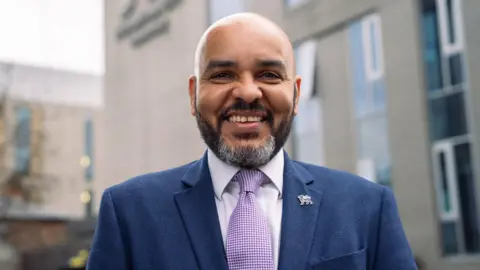 Birmingham City University
Birmingham City UniversityProf Mba said many of his students commuted from deprived parts of the West Midlands, and that BCU’s courses – including its degree apprenticeships – offered “social mobility”.
Sabeeha Anium, who studies computer science at BCU, said her degree was “not a rip-off” as she “gets to learn different things” every day.
Speaking to the BBC on her lunch break, she added: “Every single degree is valuable.”
Aaryan Shabbir, who is on the university’s accelerated two-year digital marketing course, said he would welcome seeing more apprenticeships because of concerns around student debt and finding a job post-degree.
He added: “If I’d [known] more about apprenticeships I would’ve done an apprenticeship.”
 BBC/Hope Rhodes
BBC/Hope RhodesThe Association of Employment and Learning Providers welcomed the announcement and said it hoped other political parties would “match this additional funding”.
Chief executive Ben Rowland said: “Whichever party finds itself in government, there will need to be a commitment to encouraging more employers [to] offer apprenticeship opportunities.”
Neil Carberry, chief executive of the Recruitment and Employment Confederation trade body, said the announcement was “using apprenticeships to denigrate university courses, when we need both to flourish if we’re going to grow”.
Apprenticeships are funded partly by the taxpayer as well as by the apprenticeship levy, which is essentially a tax paid by bigger businesses. Those firms, as well as smaller ones, can access the cash to spend exclusively on training apprentices.
Mr Carberry said the levy made apprenticeships more expensive to deliver – particularly lower-level apprenticeships aimed at younger people – so firms were better off if they did fewer of them.
He said while higher-level apprenticeships were replacing degrees for some people, they did not help people who would not have gone to university and needed a different route to skilled work.
Apprenticeship dropout rates in England are about one in two.
Just over half (54.6%) of apprentices completed and passed a final assessment in 2022-23 – well below the government’s 67% target by the end of 2024-25.
Asked about the dropout rate, Mr Hinds said: “It is true that some young people start an apprenticeship and then they don’t [finish it], and then they take a different turn in their career. When they do that, they’ve accumulated of course skills and experience in that job, and they’ve been earning.
“That has long been true in apprenticeships.”
Labour’s shadow education secretary, Bridget Phillipson, said the announcement was “laughable” because the Conservatives had “presided over a halving of apprenticeships for young people”.
She reiterated her party’s promises to introduce technical excellence colleges aimed at training workers for local industries, and to reform the apprenticeship levy into a “growth and skills levy”, which the party says would allow businesses to spend up to half of their levy payments on “more flexible training courses”.
Munira Wilson, education spokeswoman for the Liberal Democrats, said the Conservatives had “broken the apprenticeship system” and “urgent reform is needed”.
“The shockingly low pay for those on apprenticeships will remain, doing nothing to encourage more people to take apprenticeships up or tackle soaring drop-out rates,” she said.
Additional reporting by Branwen Jeffreys and Hope Rhodes.
Business
Danish brewer Carlsberg to buy soft drinks maker Britvic

A can of Carlsberg AS pilsner and a Britvic Plc apple drink arranged in London, UK, on Friday, June 21, 2024.
Hollie Adams | Bloomberg | Getty Images
LONDON — Soft drinks maker Britvic has agreed to a sweetened takeover bid of £3.28 billion ($4.2 billion) from Carlsberg, the companies said Monday.
The deal agreed offered 1,290 pence per share for Britvic, with a small dividend that gives shareholders 1,315 pence per share.
Britvic in June refused an improved cash takeover bid from Carlsberg offering 1,250 pence per share of the British soft drinks maker. It said at the time that the proposal “significantly undervalues Britvic, and its current and future prospects.” Carlsberg’s previous June 6 offer price of 1,200 pence per Britvic share was also declined.
Ian Durant, the non-executive chair of Britvic, said the proposed deal “creates an enlarged international group that is well-placed to capture the growth opportunities in multiple drinks sectors.” He also namechecked Carlsberg’s agreement with PepsiCo which, he said, provides the “combined group with a strong platform for continued success.”
Carlsberg CEO Jacob Aarup-Andersen said in the same statement that the deal combines “Britvic’s high-quality soft drinks portfolio with Carlsberg’s strong beer portfolio and route-to-market capabilities, creating an enhanced proposition across the UK and markets in Western Europe.”
PepsiCo is key to the deal, as Britvic bottles and distributes PepsiCo brands in the U.K. and Ireland. Carlsberg and PepsiCo earlier this year agreed to waive a “change of control clause” in the bottling contract.
Business
‘We hope we don’t see a return to 1930s protectionism’

By Jonathan Josephs, Business reporter, BBC News
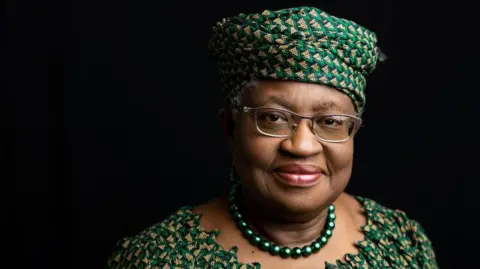 Getty Images
Getty ImagesGlobal trade “is not having the best of times at the moment”.
That is the admission of the director general of the World Trade Organization (WTO), Dr Ngozi Okonjo-Iweala. “We are seeing increasing protectionism, some undermining of the WTO rules, and some of this is leading to fragmentation,” she tells the BBC.
“Global trade is really part of the lifeblood for making countries resilient – and also for underpinning growth, so we are concerned about that.”
In recent weeks and months these fragmentations have come to the fore with the EU imposing provisional tariffs of up to 37.4% on imports of Chinese electric vehicles (EVs). It followed after the US in May introduced 100% tariffs on Chinese EVs.
Both Brussels and Washington accuse the Chinese government of unfairly subsidising its EV sector, allowing producers to export cars at unfairly low prices, and threatening jobs in the West.
President Biden has also increased import taxes on a range of other Chinese products that he said formed “the industries of the future”. These include EV batteries and the minerals they contain, the cells needed to make solar panels, and computer chips.
Meanwhile, the US has been pouring billions of dollars of government money into green technology, through its Inflation Reduction Act, which aims to reduce a reliance on Chinese imports.
EU trade commissioner Valdis Dombrovskis tells the BBC that Europe does not want to close the market for EVs. “We welcome imports, we welcome competition, but this competition must be fair,” she says.
Last year, the volume of global trade fell for just the third time in 30 years, according to the WTO. It says the 1.2% decline was linked to higher inflation and interest rates, and is forecasting a recovery this year.
However those factors have their roots in events that are continuing to fundamentally reshape the global economy, the International Monetary Fund’s (IMF’s) first deputy managing director Gita Gopinath explained in a recent speech.
“What we’ve seen in the last few years, I would say, especially when it comes to global trade relations, is nothing like we’ve seen since the end of the Cold War.”
“The last few years, you’ve had numerous shocks, including the pandemic. We had Russia’s invasion of Ukraine, and following these events, increasingly, countries around the world are guided by economic security, and national security concerns, in determining who they trade with and who they invest in,” she said.
That’s affecting countries as far apart as Peru, Ghana and Vietnam as they increasingly find themselves having to choose between strengthening economic ties with the western powers, or a China-Russia axis.
“We’re also concerned about the emerging fragmentation that we see in the trade data,” says the WTO’s Dr Okonjo-Iweala. “We’re seeing that trade between like-minded blocks is growing faster than trade across such blocks.”
She warns that “it will be costly for the world” to continue down this path. WTO research has estimated that price at 5% of the global economy, whilst the IMF has suggested it could be nearer to 7% or $7.4tn (£5.8tn) of lost output in the long run.
 Getty Images
Getty ImagesThe EU’s introduction of tariffs on Chinese-made EVs follows a surge in their exports to Europe over the last few years. Exports jumped from $1.6bn in value in 2020 to $11.5bn last year, according to one study, which said they now made up 37% of all EV imports into the EU.
BYD, Geely and SAIC are some of the Chinese EV makers said to have benefitted from billions of dollars worth of government help.
After many years of support Chinese EV companies no longer need that help, says Jens Eskelund, president of the European Union Chamber of Commerce in China. “They are today simply very competitive on their own terms. I think the introduction of tariffs is a symptom that something is out of balance.”
When it comes to broader relationship, Mr Eskelund says it’s “mind boggling” that since 2017 the volume of goods that the EU has sold to China has fallen about a third, even though China’s economy has been growing steadily.
Citing Chinese restrictions around market access for overseas firms, and tough security regulations, he adds: “I think it’s fair to say that that Europe still remains a significantly more open market to Chinese companies, then the other way around. And that is obviously something that needs to change.”
The chamber’s recent survey showed that members have the lowest confidence on record for investing in China.
It comes as the EU is trying to lower its economic dependence on China. European Commission President Ursula von der Leyen last year described the need to “de-risk not de-couple” its relations with China.
Brussels’ concerns include Beijing using sensitive technology for military purposes, and its support for Russia as it continues its offensive in Ukraine.
Companies including Ikea, Nike and Apple are also trying to become less reliant on China.
Whilst the EU and China are set to hold talks about the potential EV tariffs, Chinese state media has reported that retaliatory measures are being considered on EU goods including pork, cognac and luxury cars.
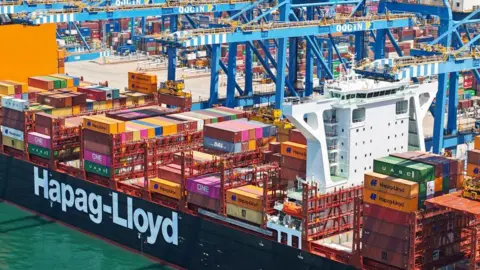 Getty Images
Getty ImagesHowever, there are other barriers for global trade to overcome, including in two of the most important arteries for moving goods around the world.
This year Panama Canal officials had to reduce the number of ships allowed to traverse the waterway. This is due to a lack of rainfall to fill the lake that feeds the canal.
Meanwhile, the Suez Canal is effectively cut off because of ongoing attacks on commercial ships by Houthi rebels in the Red Sea. Traffic through the canal is down 90%, according to logistics firm Kuehne+Nagel.
Rolf Habben Jansen, chief executive of the German shipping giant Hapag-Lloyd, says this disruption means that the rates his firm charges are up between 30% and 40%.
Whilst shipping costs are a small part of retail prices, Mr Habben Jansen says “these extra costs in the end get passed on” to consumers. That could end up pushing inflation up just as central banks are showing signs of getting it under control.
That would be “detrimental to consumers,” says the WTO’s Dr Okonjo-Iweala.
Despite all the tensions, she says trade has shown signs of resilience, and she adds that her organization can help countries solve their differences.
Meanwhile, Dr Okonjo-Iweala admits that some WTO rules will need to change to help meet the challenge of climate change. “I strongly believe that some of our [global trade] rules, we do need to look at them,” she says.
“When they were put in place, decades ago, we were not confronting the kind of climate change threats we confront today.”
Regarding the increased use of tariffs, she adds: “We hope we don’t have a repeat of what we saw in the 1930s. We had retaliatory tariffs, and it was downhill from there and everyone lost.
“So I do hope we will not enter into that kind of era again”.
Business
Biden seeks boost in Pennsylvania as calls for him to step aside mount By Reuters

By Andrea Shalal
HARRISBURG, Pennsylvania (Reuters) – An embattled U.S. President Joe Biden faced escalating pressure from fellow Democrats worried about his candidacy on Sunday, concerns he worked to ease with campaign stops in the battleground state of Pennsylvania.
Biden, 81, faces growing calls to end his reelection bid after a halting performance in a June 27 debate with Republican Donald Trump, 78, raised questions about his ability to do the job for another four years. He has vowed to stay in the race, dismissing calls for him to drop out as “nonsense” in a fundraising email on Saturday.
On Sunday, the Democratic president received a warm welcome at a Black church in Philadelphia and later traveled to the Pennsylvania state capital, Harrisburg, for an event with union members. Black voters are a critical part of Biden’s base of support and recent public opinion polling has shown their support for him softening.
On a leadership call on Sunday called by House Democratic Leader Hakeem Jeffries, some House Democrats said that Biden should step aside as presidential candidate, a source familiar with the discussions told Reuters.
Representatives Jerrold Nadler, Adam Smith, Mark Takano and Joe Morelle, senior House Democrats who sit on the Judiciary, Armed Services, Veterans Affairs and House Administration committees, were among those who called on Biden to step aside, according to media reports.
Democrats also suggested that Vice President Kamala Harris, seen as the likeliest candidate to replace Biden in the Nov. 5 election were he to bow out, could perform well.
The coming week is crucial, Democratic Senator Chris Murphy said on CNN’s “State of the Union.” He encouraged the president to hold a town hall or news conference to convince voters he is “the old Joe Biden.”
“The president needs to do more,” Murphy said. “I do think the clock is ticking.”
Democratic U.S. Representative Adam Schiff said on NBC’s “Meet the Press” that Biden needs to move swiftly to put concerns to rest.
He added that he believed Harris “could win overwhelmingly, but before we get into a decision about who else it should be, the president needs to make a decision about whether it’s him.”
Asked in Harrisburg whether the Democratic Party was behind him, Biden told reporters “yes.”
‘NEVER COUNT JOSEPH OUT’
In Philadelphia, churchgoers at the Mt Airy Church of God in Christ gave Biden a rousing welcome. Bishop Louis Felton praised him as “a man of vision and integrity.”
The bishop, referring to Biden’s Republican challenger without naming him, chided those who “make an issue of the president – that he is conditioned with stammering and not being able at certain times to bring forth words – while another person lies fluidly and you never challenge his lies.”
“Never count Joseph out,” Felton thundered. “Go, Joseph, you can make it.”
Biden addressed the congregation for a little more than six minutes, saying, “We must unite America again. That’s what I’m going to do.”
Carla Greene, a resident of Philadelphia, said she hoped Biden felt the support, adding, “we believe he is the man for the job.”
In a Friday interview with ABC News, Biden said only the “Lord Almighty” could persuade him to drop out, dismissing the prospect that Democratic leaders could join forces to try to talk him into standing down.
A Democratic National Committee member from Florida, Alan Clendenin, joined calls urging Biden to step aside on Sunday.
“Joe Biden will be remembered by historians as one of the finest presidents in American history, but this election is about the next four years, not the last three and a half,” Clendenin said.
The DNC has steadfastly supported Biden since his debate stumbles so any defections could suggest a deepening of the crisis. DNC Chair Jaime Harrison said on Sunday that Biden remains the party’s nominee. “The primary is over,” he said.
CRITICAL STATE
Biden stopped at a local campaign headquarters after church, telling supporters there, “Pennsylvania is a critically important state.”
Accompanying Biden, Democratic Senator John Fetterman bellowed, “There is only one person in the country that’s ever kicked Trump’s ass in an election and that is your president.”
Biden also met briefly with Pennsylvania’s Democratic Governor Josh Shapiro.
Pennsylvania is one of the half dozen or so states alongside Wisconsin and Michigan that can swing Democratic or Republican and are expected to determine the outcome of what has been a tight race.
Sunday’s trip – Biden’s 10th to Pennsylvania during the 2024 election campaign – is part of a July voter outreach blitz by the Democratic Party that includes a $50 million media campaign aimed at events, such as the Olympics, and travel by the president, the first lady, Harris and her husband to multiple battleground states.
Pressure from Congress is expected to ramp up in the coming days as lawmakers return to Washington from a holiday recess and donors mull their willingness to keep funding Biden’s campaign.
Biden is also preparing to host dozens of world leaders at a NATO summit in Washington this week and hold a rare solo news conference.
Five U.S. lawmakers have publicly called for Biden to end his reelection bid, including Representative Angie Craig of Minnesota, the first Democratic member of the House of Representatives from a battleground district, with others said to be poised to join in.
Two letters are circulating among House Democrats calling for Biden to step aside, House Democratic sources have said.
U.S. Senator Mark Warner of Virginia invited fellow senators to a meeting on Monday to discuss Biden’s campaign.
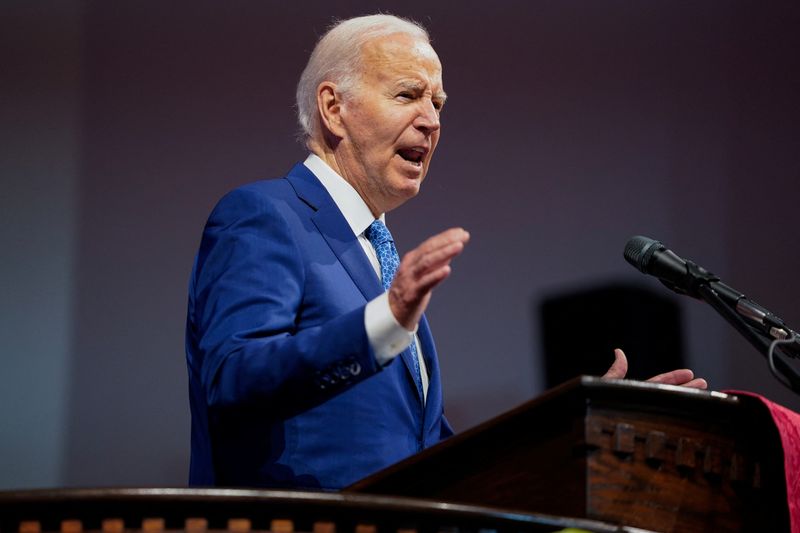
Senator Bernie Sanders, 82, who has run for the Democratic nomination for president in the past, stood firmly in Biden’s camp on Sunday, saying Democrats’ focus should be on policy.
“This is not a beauty contest,” he said on CBS’ “Face the Nation.”
-

 African History5 years ago
African History5 years agoA Closer Look: Afro-Mexicans 🇲🇽
-

 African History5 months ago
African History5 months agoBlack History Facts I had to Learn on My Own pt.6 📜
-

 African History5 years ago
African History5 years agoA Closer Look: Afro-Mexicans 🇲🇽
-

 African History1 year ago
African History1 year agoMajor African Tribes taken away during the Atlantic Slave Trade🌍 #slavetrade #africanamericanhistory
-

 African History1 year ago
African History1 year agoCameroon 🇨🇲 World Cup History (1962-2022) #football #realmadrid #shorts
-

 African History5 months ago
African History5 months agoBlack History Inventors: Mary Kenner 🩸
-

 African History1 year ago
African History1 year agoPROOF AFRICAN AMERICANS AIN'T FROM AFRICA DOCUMENTED EVIDENCE
-

 African History1 year ago
African History1 year agoNo African pre-Columbus DNA? 🤯🤯 #history #mesoamerica #mexico #african

























